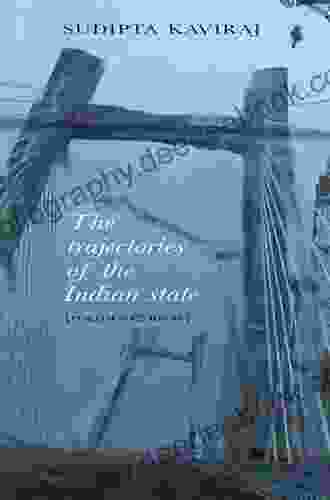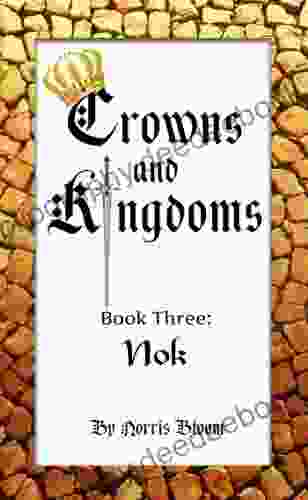The Trajectories of the Indian State: A Historical and Comparative Perspective

4.9 out of 5
| Language | : | English |
| File size | : | 914 KB |
| Text-to-Speech | : | Enabled |
| Screen Reader | : | Supported |
| Enhanced typesetting | : | Enabled |
| Word Wise | : | Enabled |
| Print length | : | 316 pages |
The Indian state is a complex and fascinating institution with a long and storied history. Its origins can be traced back to the ancient Indian civilization, which flourished in the Indus Valley from around 2600 to 1900 BCE. The state played a central role in the development of Indian civilization, providing for irrigation, defense, and other essential services.
After the collapse of the Indus Valley civilization, India entered a period of political fragmentation. However, the state began to re-emerge in the 6th century BCE, with the rise of the Mauryan Empire. The Mauryan Empire was one of the largest and most powerful empires in the world, and its rulers established a centralized state that controlled much of the Indian subcontinent.
The Mauryan Empire collapsed in the 2nd century BCE, and India once again entered a period of political fragmentation. However, the state continued to play an important role in Indian society, and it re-emerged in a new form in the 3rd century CE, with the rise of the Gupta Empire. The Gupta Empire was another powerful empire that controlled much of the Indian subcontinent. It was during this period that the Indian state began to take on its modern form, with a centralized bureaucracy and a system of taxation.
The Gupta Empire collapsed in the 6th century CE, and India once again entered a period of political fragmentation. However, the state continued to play an important role in Indian society, and it re-emerged in a new form in the 13th century CE, with the rise of the Delhi Sultanate. The Delhi Sultanate was a Muslim dynasty that ruled over much of the Indian subcontinent. It was during this period that the Indian state began to adopt Islamic institutions, such as the sharia law.
The Delhi Sultanate collapsed in the 16th century CE, and India was conquered by the Mughal Empire. The Mughal Empire was a powerful Muslim dynasty that ruled over much of the Indian subcontinent. It was during this period that the Indian state reached its zenith, with a centralized bureaucracy, a powerful army, and a system of taxation that was able to generate a large revenue.
The Mughal Empire collapsed in the 18th century CE, and India was divided into a number of smaller states. These states were eventually conquered by the British East India Company, which established a colonial regime in India. The British Raj was a period of great change for the Indian state, as the British introduced a number of new institutions, such as the railways, the telegraph, and the postal service.
The British Raj ended in 1947, and India became an independent republic. The Indian state has undergone a number of changes since independence, but it has retained many of the features that were introduced during the British Raj. For example, the Indian state continues to have a centralized bureaucracy, a powerful army, and a system of taxation that is able to generate a large revenue.
The Indian state is a complex and fascinating institution with a long and storied history. It has played a central role in the development of Indian civilization, and it continues to play an important role in Indian society today.
Comparative Perspectives on the Indian State
The Indian state is a unique institution, but it also shares some similarities with other states around the world. For example, the Indian state is a centralized state, with a powerful bureaucracy and a strong military. This is similar to the states of China, Russia, and France.
However, the Indian state is also a democratic state, with a freely elected parliament and a constitution that guarantees individual rights. This is similar to the states of the United States, the United Kingdom, and Canada.
The Indian state is also a secular state, which means that it does not favor any particular religion. This is similar to the states of the United States, France, and Turkey.
However, the Indian state is also a welfare state, which means that it provides a number of social services to its citizens. This is similar to the states of the United Kingdom, Germany, and Sweden.
The Indian state is a complex and fascinating institution that shares some similarities with other states around the world. However, it is also unique in many ways, and it has played a central role in the development of Indian civilization.
The Indian state is a complex and fascinating institution with a long and storied history. It has undergone a number of changes over time, but it has retained many of its core features. The Indian state is a centralized state, a democratic state, a secular state, and a welfare state. It is also a unique institution that has played a central role in the development of Indian civilization.
4.9 out of 5
| Language | : | English |
| File size | : | 914 KB |
| Text-to-Speech | : | Enabled |
| Screen Reader | : | Supported |
| Enhanced typesetting | : | Enabled |
| Word Wise | : | Enabled |
| Print length | : | 316 pages |
Do you want to contribute by writing guest posts on this blog?
Please contact us and send us a resume of previous articles that you have written.
 Page
Page Chapter
Chapter Text
Text Story
Story Reader
Reader Library
Library E-book
E-book Newspaper
Newspaper Sentence
Sentence Glossary
Glossary Bibliography
Bibliography Foreword
Foreword Preface
Preface Synopsis
Synopsis Annotation
Annotation Manuscript
Manuscript Scroll
Scroll Codex
Codex Tome
Tome Bestseller
Bestseller Biography
Biography Reference
Reference Encyclopedia
Encyclopedia Dictionary
Dictionary Thesaurus
Thesaurus Narrator
Narrator Character
Character Resolution
Resolution Archives
Archives Study
Study Research
Research Lending
Lending Academic
Academic Rare Books
Rare Books Special Collections
Special Collections Thesis
Thesis Awards
Awards Book Club
Book Club Theory
Theory Textbooks
Textbooks Stephen Jones
Stephen Jones Kamel Daoud
Kamel Daoud L Ron Hubbard
L Ron Hubbard Dave Connis
Dave Connis Karim M Lalani
Karim M Lalani Laurence Dahners
Laurence Dahners Dan Roodt
Dan Roodt Joan L Coffey
Joan L Coffey Edward Sylvester Ellis
Edward Sylvester Ellis Katie Ruggle
Katie Ruggle Belle Boss
Belle Boss David Robertson
David Robertson J D Harelik
J D Harelik Clint Stoker
Clint Stoker Myron Golden
Myron Golden Naomi Mitchison
Naomi Mitchison Maurizio Roscini
Maurizio Roscini Anya Seton
Anya Seton Dunja Schnabel
Dunja Schnabel Zachary David Levy
Zachary David Levy
Light bulbAdvertise smarter! Our strategic ad space ensures maximum exposure. Reserve your spot today!
 Jordan BlairFollow ·6.2k
Jordan BlairFollow ·6.2k Zachary CoxFollow ·11.8k
Zachary CoxFollow ·11.8k Billy FosterFollow ·9.7k
Billy FosterFollow ·9.7k Andy ColeFollow ·6.6k
Andy ColeFollow ·6.6k Jared PowellFollow ·17.1k
Jared PowellFollow ·17.1k Allan JamesFollow ·14.5k
Allan JamesFollow ·14.5k Morris CarterFollow ·6.3k
Morris CarterFollow ·6.3k Tim ReedFollow ·10.4k
Tim ReedFollow ·10.4k

 Braden Ward
Braden WardFeminism's Forgotten Fight: The Ongoing Battle for...
The feminist movement has historically...

 Julio Cortázar
Julio CortázarBlue Heaven Black Night: A Literary Journey Through Love,...
In the realm of...

 Eddie Bell
Eddie BellA Journey Through Time: Exploring the Enchanting World of...
The vibrant tapestry of New...

 Lawrence Bell
Lawrence BellValiance Dragon Soul Press Anthology: A Literary Odyssey...
Step into a realm where...

 Aron Cox
Aron CoxEmbark on a Creative Odyssey with Jean Leinhauser's "101...
Unveil a Kaleidoscope of...
4.9 out of 5
| Language | : | English |
| File size | : | 914 KB |
| Text-to-Speech | : | Enabled |
| Screen Reader | : | Supported |
| Enhanced typesetting | : | Enabled |
| Word Wise | : | Enabled |
| Print length | : | 316 pages |














